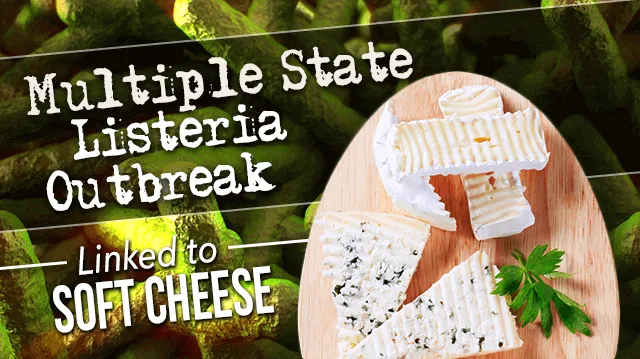A Listeria outbreak, which began on September 24, 2010 has now spread across nine states. It has been five years since the Listeria outbreak was first reported, and health officials have been scrambling to find the source. The outbreak is being investigated by several state health organizations, the U.S. Food and Drug Administration (FDA), and the Centers for Disease Control and Prevention (CDC).
According to the CDC and FDA, the source has been narrowed down to soft cheese produced by Karoun Dairies, which is headquartered in San Fernando, California. A voluntary recall statement, issued on September 16, 2015 reads, “To date, no product has tested positive for Listeria but in view of the association with listeriosis cases Karoun Dairies Inc. is initiating a voluntary recall in the interest of protecting public health.”
Since the first reported case in 2010, 24 people have been infected. Five of the infected were pregnant women, one suffering a miscarriage. There has also been one confirmed death in Ohio associated with the Listeria outbreak, according to the CDC and FDA. The states affected by the outbreak include California, Colorado, Illinois, Massachusetts, Michigan, New York, Ohio, Tennessee, and Washington. California has had the most reported cases to date.
Karoun Dairies came into question after patients recalled eating the company’s brand of soft cheese. Further data also found that 83 percent of those affected had eaten soft cheese within the month they fell ill. There are 15 specific cheese products listed in Karoun Dairies recall statement. The cheeses were sold under the brand names of Karoun, Arz, Gopi, Queso Del Valle, Central Valley Creamery and Yanni. More information regarding the Listeria outbreak and the cheese types and brands can be found on the CDC, FDA and Karoun Dairies websites.
Listeriosis symptoms can vary, however, according to the CDC general symptoms include fever and muscle aches, and sometimes nausea and gastrointestinal problems. The CDC also states, “The disease primarily affects older adults, pregnant women, newborns, and adults with weakened immune systems.” Five of the 24 cases in this particular Listeria outbreak were found in pregnant women, who often think that cheese is safe to eat during pregnancy.

Cheese is delicious, and for those who have no problem digesting dairy products, cheese can make a dish a whole lot more delicious. However, in light of this Listeria outbreak, one begins to wonder what is safe to eat anymore. Taking an active role in knowing where your food comes from can make all the difference in the world. Many Listeria outbreaks lead back to large manufacturing plants where the bacteria can stay active, even in cold temperatures.
Where do you get your cheese?
-Stephen Seifert
Stephen Seifert is a writer, professor, adventurer and a health & fitness guru. His flare for travel and outdoor adventure allows him to enjoy culture and traditions different than his own. A healthy diet, routine fitness and constant mental development is the cornerstone to Stephen’s life.
Sources:
http://www.cdc.gov/listeria/outbreaks/soft-cheeses-09-15/
https://www.karouncheese.com/pdf/Recall.pdf
http://www.cdc.gov/listeria/definition.html
http://www.ingentaconnect.com/content/iafp/jfp/2011/00000074/00000006/art00012
